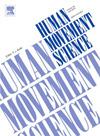一种新型运动项目对感觉加工障碍儿童运动技能发展的影响
IF 1.9
3区 心理学
Q4 NEUROSCIENCES
引用次数: 0
摘要
SPD是一种影响健康发育和日常功能的神经发育障碍。本研究采用干预组和对照组的对照试验设计,探讨了为期六周的运动干预对SPD组大肌肉运动发展的影响。54名儿童参加了这项研究,分为接受治疗性运动的SPD组和接受常规体育训练的TD(典型发育)对照组。采用TGMD-3大肌肉运动发展量表评估干预前后的得分,并进一步评估干预组干预后和对照组正常训练前的得分。结果显示,干预前,TD对照组的综合得分、运动技能和球技得分显著高于SPD组,但两组的综合得分、运动技能和球技得分从干预前到干预后均有显著改善。干预后,TD对照组的综合得分和球类技能得分显著高于SPD组,但运动技能得分不显著高于SPD组。干预后,TD对照组和SPD组之间的差异显著减小。SPD组显著提高了身体素质、运动技能和表达能力。干预显著促进了大肌肉运动的发展,这表明定制的锻炼计划可以改善运动功能。干预应侧重于增强感觉功能和促进大肌肉运动的发展。运动干预对改善大肌肉运动功能至关重要,应作为一个重要组成部分纳入康复计划。本文章由计算机程序翻译,如有差异,请以英文原文为准。
Effect of a novel exercise program on the development of motor skills in children with sensory processing disorders (SPD)
SPD is a neurodevelopmental disorder affecting healthy development and daily functioning. This study investigated the effect of a six-week exercise intervention on gross motor development in SPD group using a controlled trial design with intervention and control groups. Fifty-four children joined this study, categorized into the SPD group receiving therapeutic exercise and the TD (Typically Developing) control group receiving regular physical training. Scores were evaluated pre- and post-intervention using TGMD-3 to assess gross motor development, and further evaluated the scores of the intervention group post-intervention and the control group prior to normal training. Results revealed significantly higher composite, locomotor skills, and ball skills scores in the TD control group than the SPD group pre-intervention, however both groups showed significant improvements in composite scores and the locomotor skills and ball skills scores from pre- to post-intervention. The TD control group showed significantly higher composite scores and ball skills scores post-intervention than the SPD group but not locomotor skills scores. The differences between the TD control group and SPD group reduced substantially post-intervention. SPD group significantly improved physical fitness, motor skills, and expressive abilities. The intervention significantly promoted gross motor development, suggesting that customized exercise programs could improve motor function. Interventions shall focus on enhancing sensory function and promoting gross motor development. Exercise intervention is crucial in improving gross motor function and should be integrated into rehabilitation programs as an essential component.
求助全文
通过发布文献求助,成功后即可免费获取论文全文。
去求助
来源期刊

Human Movement Science
医学-神经科学
CiteScore
3.80
自引率
4.80%
发文量
89
审稿时长
42 days
期刊介绍:
Human Movement Science provides a medium for publishing disciplinary and multidisciplinary studies on human movement. It brings together psychological, biomechanical and neurophysiological research on the control, organization and learning of human movement, including the perceptual support of movement. The overarching goal of the journal is to publish articles that help advance theoretical understanding of the control and organization of human movement, as well as changes therein as a function of development, learning and rehabilitation. The nature of the research reported may vary from fundamental theoretical or empirical studies to more applied studies in the fields of, for example, sport, dance and rehabilitation with the proviso that all studies have a distinct theoretical bearing. Also, reviews and meta-studies advancing the understanding of human movement are welcome.
These aims and scope imply that purely descriptive studies are not acceptable, while methodological articles are only acceptable if the methodology in question opens up new vistas in understanding the control and organization of human movement. The same holds for articles on exercise physiology, which in general are not supported, unless they speak to the control and organization of human movement. In general, it is required that the theoretical message of articles published in Human Movement Science is, to a certain extent, innovative and not dismissible as just "more of the same."
 求助内容:
求助内容: 应助结果提醒方式:
应助结果提醒方式:


